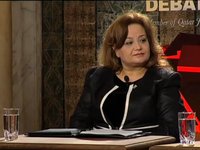This House believes that Arab revolutions will just produce different dictators
Tuesday February 22 2011
Tunis, Tunisia
MOTION REJECTED
by 26% to 74%
Transcript
Order of speeches

- Introduction
- Raoudha Ben Othman
- Shibley Telhami
- Kamal Ben Younes
- Fares Mabrouk
- Audience questions
- Vote result
Introduction
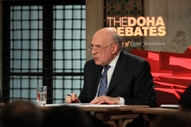 TIM SEBASTIAN
TIM SEBASTIAN
Ladies and gentlemen, a very good evening to you and welcome to this very special edition of The Doha Debates coming to you from the heart of the post-revolution capital of Tunisia and sponsored by the Qatar Foundation. We're told that this is in fact the first totally free political debate in this country for decades, so we're doubly delighted to be here tonight and to exercise that freedom with you. We're in the medina in the centre of Tunis just a short distance from where thousands of demonstrators overthrew their president Ben Ali on January 14th, an uprising that triggered unprecedented violence and upheaval right across North Africa and into the Gulf. But as the turmoil continues, how secure are these revolutions, and in Tunisia and Egypt, what are the chances that new autocrats will take the place of the old ones, questions that lie at the centre of our motion tonight: "This House believes that Arab revolutions will just produce different dictators". We have as ever a very deeply divided panel. In favour of the motion, Raoudha Ben Othman. She's professor of linguistics at the University of Tunis and writes on education and politics for several publications including Assabah and Al-Chourouk. And with her, Kamal Ben Younes, Executive Director of the International Studies Association and Institute Tunisia. He's also professor of history and media at the country's Manouba University. Against the motion, Dr. Shibley Telhami, professor of peace and development at the University of Maryland in the United States, and a senior fellow at the Brookings Institution. He's a former adviser to the US mission to the United Nations and the Iraq Study group. And with him Fares Mabrouk. He recently returned to Tunisia to set up the Arab Policy Institute, which aims to support democratic change in the Middle East and North Africa. He served in the Tunisian Ministry of Energy and Industry, and is a Yale World Fellow. Ladies and gentlemen, our panel. So now let me first of all ask Raoudha Ben Othman to speak for the motion. You have two minutes please.
Raoudha Ben Othman
Speaking for the motion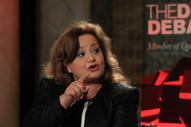
RAOUDHA BEN OTHMAN
Well, I have received many emails from all over the world asking me about what made the Tunisian revolution happen, and I was personally, this made me very proud and I felt as a Tunisian this is excellent, but at the same time I feel very worried. I am worried that, I mean, asking the dictator to leave did not end dictatorship. We certainly, Tunisians and Egyptians have asked both presidents to leave and this is not enough. The way to democracy is far and I feel that we have to learn other ways in order to ensure democracy. I feel personally that at least we have three obstacles that inhibit us from reaching democracy and these make the Arab political body not immune to dictatorship, and we need actually to improve these, I mean, to get rid of these obstacles, and these obstacles at least to me, I think that we have three main obstacles. The first one is lack of accountability, lack of transparency, and a very entrenched habit of being loyal to individuals, and unless we get rid of these cultural ways of being governed we are going to see other dictators. Right now not even 500 metres away from this shooting location, we have Tunisian young people in a sit-in and they have been in this sit-in asking very clear political demands. Are they going to do it in the future? How many people are going to go out in the streets and demonstrate and ask for freedom? What is going to happen with a new government who is going to consider that any demonstration or sit-in is a way of disturbance? Are they going to insist? I think that we need to elaborate, we need to change, we need to make ourselves better able, we need to practise ...
TIM SEBASTIAN
Could you come to a close please?
RAOUDHA BEN OTHMAN
We need to practise new democratic forms that will guarantee sustainable democracy.
TIM SEBASTIAN
Raoudha Ben Othman, thank you very much indeed. It's been five weeks, you've had a purge of police, you've had a purge of ministers, you've had a purge of editors. What more do you want in five weeks' time? I mean they've done pretty well, haven't they? They've secured the revolution.
RAOUDHA BEN OTHMAN
But at the same time all we have got from the people in the government are some promises for a free election.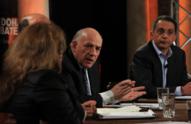 TIM SEBASTIAN
TIM SEBASTIAN
But that's not all you've got. You've purged some of the most hated members of the old regime, haven't you, hated members of the security forces and police.
RAOUDHA BEN OTHMAN
But how can we be sure that these are the only sources of trouble.
TIM SEBASTIAN
But isn't it a good start for five weeks? They've moved quickly, haven't they? Give them time.
RAOUDHA BEN OTHMAN
Well, how do you explain the people out in the streets? It seems that dictatorship comes under many faces.
TIM SEBASTIAN
More difficult in the rain I grant you, but they're trying to support the revolution, aren't they?
RAOUDHA BEN OTHMAN
You will see them, if you go right now you will see them. Actually there are many faces to dictatorship. We have already identified at last two, one of Ben Ali and one Mubarak. We are not sure that there are not other faces. I think we are somehow guilty as Arabs. We tend to let dictators and dictatorship flourish in a certain way.
TIM SEBASTIAN
But you've cut off the head, in the first few weeks, in five weeks you've cut off the head ...
RAOUDHA BEN OTHMAN
We are going to make a new head.
TIM SEBASTIAN
...you've started an investigation into corruption, you've created some 30 political parties, you've played ping-pong with ministers, you've brought them in, you've kicked them out again, it's an extraordinary event, isn't it, and you say it's not enough. What more do you want in five weeks?
RAOUDHA BEN OTHMAN
We want the Arabs in general to learn a new form of political participation, to develop new practices of democracy. I cannot guarantee that the next government, I mean, who is going to be elected, some form of democracy.
TIM SEBASTIAN
All right.
RAOUDHA BEN OTHMAN
But not all forms of democracy.
TIM SEBASTIAN
Raoudha Ben Othman, we have to leave it there for the moment, we'll come back to you. Thank you very much indeed. Now let me please ask Shibley Telhami to speak against the motion.
Shibley Telhami
Speaking against the motion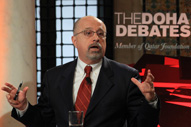
SHIBLEY TELHAMI
Well, thank you very much. I certainly acknowledge immediately that there are obviously risks whenever you have a transition and they can go backward, but I would submit to you that we're upon the greatest Arab public awakening since the end of World War I. It is sweeping the region and there is no looking back. Now let me tell me why I think that. Obviously we've known for years that there's a gap between governments and publics in the Middle East, that was not a surprise, but what is the surprise is the huge public empowerment the likes of which we have never witnessed, that does not require the intermediary forces of political parties and organisations, and it is enabled by something that we cannot stop, and that is the information revolution, with all its parts: the satellite television revolution, the internet revolution, they have done three things. Number one, they have robbed governments of monopoly of information and enabled the public to go directly to information without the government. Number two, they linked people to the outside world in a way that enabled them to see that there is a better world out there than they have, and to be empowered by the fact that other people are watching them and know their state of affairs, and number three, it's given them an interactive method to organise and communicate instantly without the need for political parties. Those forces of history are irreversible. It means that no government, no matter what form it takes, no matter who's ruling, cannot ignore its public. No government can ignore its public. I cannot guarantee you what form the governments are going to take, in every single country it's going to differ, but we have a new dynamic and that dynamic is the public voice will be heard. There is a new equation: no government can dismiss its public opinion when dealing with the outside world or the inside world, and they're going to have to put it as part of the equation and that means dictatorships as we have known them in the past several decades are over.
TIM SEBASTIAN
Shibley Telhami, thank you very much indeed. You say that no government can ignore public opinion, but the public is expressing 30, 40, 50 different opinions here every day, so which one do they listen to?
SHIBLEY TELHAMI
All of them.
TIM SEBASTIAN
It's easy to say. How do you do it?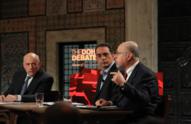 SHIBLEY TELHAMI
SHIBLEY TELHAMI
No. Here is what I mean by it. Clearly when you have multiple opinions, governments are going to have to sort if out, but that's what we have in open societies.
TIM SEBASTIAN
You have the head of the higher political reform commission here in Tunisia saying: "You're on the edge of anarchy." He says: "Anarchy always leads to dictatorship." Five weeks after the revolution, this senior person in the transition is saying that Tunisia is standing on the edge of anarchy, and you say it can't go backwards.
SHIBLEY TELHAMI
This is the threat that every dictator uses to scare people.
TIM SEBASTIAN
But he's not a dictator, poor man; he's only head of the higher political reform commission.
SHIBLEY TELHAMI
But they do use it, dictators use it, they use it all the time. They scare people and historically yes, it's true, people fear anarchy, and they don't want anarchy, and we've seen what happened in Iraq, right after the fall of Saddam Hussein, there was anarchy, and people in the Arab world did fear. They would rather be in Tunis than in Baghdad and they would rather be in Cairo than in Baghdad, so anarchy is always a threat.
TIM SEBASTIAN
But you're getting serious warnings. You've got the President of the Tunisian Bar Association who says the Ben Ali system is still in place. He says there are a hundred judges that were totally corrupt.
SHIBLEY TELHAMI
If you ask people in Tunis ...
TIM SEBASTIAN
How are you going to move on, with that in place?
SHIBLEY TELHAMI
Well, you can move on, the transition to rule obviously is very complicated, but there is something psychological that is more profound. If you ask people in Tunis or in Egypt what is different today than two months ago: fear is gone, and if fear is gone, that means an empowerment of the individual. We don't know how it's going to play itself out. I cannot tell you ...
TIM SEBASTIAN
And if order breaks down as well, what then?
SHIBLEY TELHAMI
I cannot tell you that I can predict what shape or form it's going to take, but I can predict that no government can ignore the public. Let's be modest Tim. None of us including us political scientists who are very good at predicting the past, have predicted this wave that we have, and that is because we typically look at the past and say because it happened in the past, it must happen in the future, which goes against what is a profound change in history.
TIM SEBASTIAN
Shibley Telhami, thank you very much, we'll leave it there for the moment. Could I please ask Kamal Ben Younes to speak for the motion.
Kamal Ben Younes
Speaking for the motion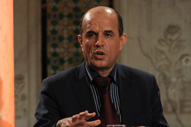
KAMAL BEN YOUNES
Sure. I'm with the hope, with the dream, I'm with the revolution, I am for democratisation, and that explains why I'm for the motion at the same time, because the collapse of dictator will never mean the collapse of dictatorship. We still have in our country, in Tunisia, in Algeria and Morocco and Egypt, dozens of thousands of dictators in security system, in political system, in business systems. They're still there. We had the collapse of the head of the regime, not of the mafia, the corrupted people. This is the first element. The second element for the dictatorship and the corrupted people and the corruption, we have partners, they have partners. Ben Ali and Mubarak and others have partners from within the state and outside the state - Americans, Europeans and other mafia, the mafia who are supporting now Gaddafi regime, killing his people. Third, there is no leadership of this movement. It was first youth, then revolt, then revolution. There is a risk now. We have 30 or 40 leaders. There is no common leadership. There are no political and social programmes. We have slogans talking about a revolution committee. Another element: the lack of democratic culture from within the civil society, the opposition leader, Islamic Movement and others. Another element: there is a lack of self-criticism and we can't go to true democratisation without self-criticism from within the civil society and a political party. And the last factor, but not least, is that US and some American companies, new companies, will stay here, their priority is not democratisation of the region. Their priority is security of Israel, their security, the weapons of mass destruction (WMD) and other priorities than the civil society and the democratisation issue.
TIM SEBASTIAN
Right. Kamal Ben Younes, thank you very much. I want to get back to a point, which this side made. You see it on the walls of many of the streets here, you see the slogan: "We're not afraid any more." Have you ever known a dictator come back who wasn't able to inspire fear? If they can't inspire fear, they won't come back, will they? Has a dictator ever been able to rule without fear?
KAMAL BEN YOUNES
No, no. The dictator will not come back.
TIM SEBASTIAN
But you're on that side of the motion; you're on that side of the motion, that's the one that you are supporting, This House believes that Arab revolutions will produce different dictators. That's the side that you are on.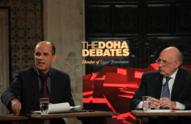 KAMAL BEN YOUNES
KAMAL BEN YOUNES
We will have new dictators.
TIM SEBASTIAN
How, if there's no fear among people? Are these people afraid do you think, out here?
KAMAL BEN YOUNES
No, they are optimists but I think they are afraid because there are a lot of signs that the dictatorship is still there. We have the same establishment in political level and security level; in all the political institutions. We cut the head but the body of dictatorship is still there.
TIM SEBASTIAN
There's been no new dictators in the Facebook generation. No new dictators have come to power since Facebook arrived, since the internet arrived. The old ones are hanging on maybe but there have been no new dictators since the internet revolution, have there, and you're saying new dictators are going to come back to the Arab world? How, if they don't control information, how are they going to come back? How are they going to repress their people?
KAMAL BEN YOUNES
First of all in our media we still have a lot of red lines, and in Egypt, in my point of view we will move to the military system, the same regime without Mubarak, with more margin of freedom but we have to work through democratisation because we have hundred of thousand of dictators on the system and the political system and security system, in military system who are the ruling party in our countries.
TIM SEBASTIAN
All right Kamal Ben Younes, thank you very much indeed. Could I please ask now Fares Mabrouk to speak against the motion.
Fares Mabrouk
Speaking against the motion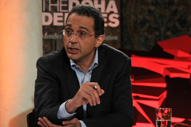
FARES MABROUK
Yes, thank you. Let me begin by saying that there has always been and obviously is still going on, a deep misunderstanding of the Arab world. Five minutes before Mohamed Bouazizi set himself, and the whole Arab world, on fire, this country was one of the most stable countries in the Arab world, and this evaluation was made by the most eminent scholars, political science, universities, organisations, and even some Tunisian elites, journalists and scholars, and this shows you how this part of the world has always been misunderstood or mis-evaluated. The reality is different. The reality is that believing that the dictatorship, time of dictatorship is not over is an optical illusion. It's again a misunderstanding of the reality. The reality is that there is a new generation in Tunisia and in the Arab world. We are pluralistic, we are global, we are educated, and we are connected. We are certainly believers, but our model is not Saudi Arabia, is not Iran. Even the most conservative part of our society looks at Turkey rather than Afghanistan. Dictatorship will not be restored because all the classes of our society will oppose it. This type of regime lost its support inside the country, inside the Arab world and outside of it. Dictatorships are no more the battlement or the safeguards against radicalism. You know, this motion is not about the Arab world. This motion is about us, the four hundred million people that are going to watch this show.
TIM SEBASTIAN
Please come to an end.
FARES MABROUK
Yes. The motion is about our understanding of the Arab world, our capacity to understand what happened and how this Arab world changed.
TIM SEBASTIAN
All right, Fares Mabrouk, thank you very much indeed. You say all the classes will oppose any return of dictators, including the two million members of the President's old party? Including the hundred corrupt judges that the head of the Tunisian Bar Association is talking about? Including the people who've made money out of the last system, who profited by it, you think they'll just go away tomorrow? You don't think they're waiting to come back and find ...
FARES MABROUK
No, I don't think so.
TIM SEBASTIAN
... a new environment of chaos in which they can come back to the fore?
FARES MABROUK
I don't think so, because ...
TIM SEBASTIAN
How do you know?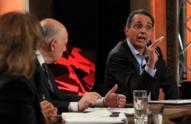 FARES MABROUK
FARES MABROUK
Because we know today that dictatorship will lead to kleptocracy. Even the private sector knows that. I mean ...
TIM SEBASTIAN
But if law and order breaks down, aren't people going to be saying "For heaven's sake, bring us back some order, bring us back us back some strong rule."
FARES MABROUK
No, we don't, you know, I'm saying only one thing, I'm saying that at the end, what only counts and what only matters is the people's will, and when you read all the slogans, you will see that people's will. I mean, all the slogans are around dignity, liberty, freedom of speech, and at the end...
TIM SEBASTIAN
But they all want different things.
FARES MABROUK|
No, they want only one thing.
TIM SEBASTIAN
Nobody can even agree on what kind of constitution, whether they want to tear up the present constitution or do they want to rewrite the existing one. Nobody can agree on the way forward.
FARES MABROUK
You will have this discussion all around the world, in every democracy.
TIM SEBASTIAN
You're getting warnings that the country is on the brink of anarchy and you say: "Everything's fine."
FARES MABROUK
I'm very optimistic, yes.
TIM SEBASTIAN
..everything's fine. Emotionally optimistic, not based on facts.
FARES MABROUK
I'm very optimistic, yes, and this is why you are here because you are very optimistic, this is why you are here in Tunis today.
TIM SEBASTIAN
Fares Mabrouk, thank you very much indeed. I'm going to throw the question now open to the audience: "This House believes that Arab revolutions will just produce different dictators." So we'll take your questions. As we said earlier, please keep them very short. Gentleman at the back, we'll get a microphone to you if you'd stand up please.
Audience questions
AUDIENCE (M)
The question is, I don't want to challenge anyone or anything, but my question goes right away to the speakers and I think the biggest threat to any democratic development here, it is the people who would rapidly change their position and don't know actually where they stand, so it's people who were with the regime, and in 20 seconds they are on the other side and I think that's the biggest threat. What is your opinion?
TIM SEBASTIAN
Shibley Telhami, would you like to take that?SHIBLEY TELHAMI
You know, I think there's no question that there are vested interests, and I have to be clear on this, the people who are going to change their position, they read the tea leaves and they have to survive. When I say there is something about public empowerment, it shouldn't be misunderstood. I don't think the public voice is ever the only voice in governing. It's not. Society has a division of power and power matters. I'm a realist. I understand that institutions, economic power, matter a lot in the governance, and in a place like Egypt or in a place like Tunisia, the military institution will remain very powerful. Business is going to remain an important factor. Society is not divided equally, whether it's economically or in terms of education. You're going to have distribution of power in every society. What is different, what I'm suggesting is different is that now a voice that was not counted at all in the calculations of governance, particularly in foreign policy but also in domestic politics, whatever they did, it was just discounted as an important voice, is now a factor in the calculations. It's not the only one but it is a factor.
TIM SEBASTIAN
I'd like if I may just to go back to the questioner a moment, if you'd stand by that. Do you still have the microphone? Do you agree with that answer, because your question, what lies behind your answer seems to be you think people will switch back again just as easily as a switch?
AUDIENCE (M)
I certainly agree that throughout history we have seen that people who actually had benefited from a certain regime are very rapidly changing their position to benefit from another, and that is the biggest threat to any change, democratic change, and unfortunately that is what's happening in this country right now.
TIM SEBASTIAN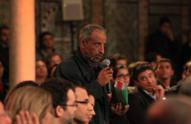 All right, we'll take another question. Gentleman in the fourth row there. You sir, we'll get a microphone there.
All right, we'll take another question. Gentleman in the fourth row there. You sir, we'll get a microphone there.
AUDIENCE (M)
Thank you, Mr. Chairman. I certainly go along with Mr. Mabrouk's views: being optimistic and also setting the debate within the cultural, social, and relative scope. My question will actually translate my views. I would like to ask you this question, sir. If the title of the debate were read like this: "This House believes that a Russian revolution will necessarily produce a new dictator", would that still go along with your views? If instead of having the qualifier 'Arab', if we had 'Russian'
TIM SEBASTIAN
I wonder if we could just stay within the confines, we've got enough to talk about within the confines of Egypt and Tunisia, if we may just stay within those confines.
AUDIENCE (M)
Actually my question underlies the social background, the cultural background. In other words, if in the Arab world we are labouring under determinism, some form of determinism, not being able to produce democracy, therefore condemned to produce only dictators, in this case let's take another case.
TIM SEBASTIAN
Okay, I think in the first free political debate in Tunisia and in this part of the region we are actually going to stay with this subject. I want to just take another question, gentleman in the second row please.AUDIENCE (M)
The region's revolution has been initiated by the death of Mohamed Bouazizi, may God rest his soul, but do you think that there is foreign intervention in the other Arab countries' revolutions ...
TIM SEBASTIAN
What do people think of the foreign interventions?
AUDIENCE (M)
No, is there any foreign intervention in initiating the other Arab countries' revolutions?
TIM SEBASTIAN
Raoudha Ben Othman, do you want to take that?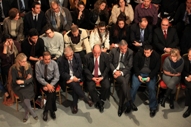 RAOUDHA BEN OTHMAN
RAOUDHA BEN OTHMAN
Thank you actually for this question and I really would like to pay a tribute to all the victims, but why do you suppose that there is a foreign action?
AUDIENCE (M)
Maybe ...
TIM SEBASTIAN
Sorry, could you say that again.
AUDIENCE (M)
Maybe it's in order to change the dictatorship face in front of the world.RAOUDHA BEN OTHMAN
This is exactly the motion we are discussing. I personally think that we are able to change things provided that we know how to change them. I think all Arabs right now, they long for change. They know the examples not to follow. They know that Ben Ali and Mubarak and many others who are going to follow, are the bad examples, and I don't think there will be any other dictator who looks like exactly Ben Ali, and don't forget that we have elected the dictators. The dictators are not born overnight. They have gone through elections and I would like, if I may, comment on what Shibley said. He said that public voice will be heard. This is exactly my worry. I see politicians in Tunisia right now. They would like to have our vote, but not our voice. They have not been used to listening to us, the people, and also we have not developed the right ways in order to communicate together. I think we have to educate our politicians.
TIM SEBASTIAN
Shibley, do you want to come back on that?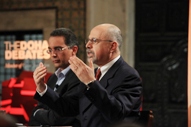 SHIBLEY TELHAMI
SHIBLEY TELHAMI
I want to come back on both of them, the foreign intervention too, because I think the foreign intervention is a very important one because I think in the Arab political culture there's certainly fear of imperialism and outside intervention, and it's been used by a lot of leaders to scare people off. I think people want the end of repression but they fear foreign intervention and control even more, and in some ways I think American policy in the Iraq war delayed the natural forces of change in the region by kind of implicating an agenda that people oppose. I think what has been extraordinary about what happened in Tunisia and Egypt is it was very hard to say for anyone that there was some foreign hand in what happened. That's the power of it and that's why it spilled over, and sure a lot of foreign players have something at stake and they will try to, you know, hijack it, but I think there is an indigenous momentum that is unstoppable. Now ...
TIM SEBASTIAN
Very briefly please.
SHIBLEY TELHAMI
Yes. I'm sorry, I, what was the point?
RAOUDHA BEN OTHMAN
You said earlier in the debate that public voice will be heard ...
SHIBLEY TELHAMI
Yes.
RAOUDHA BEN OTHMAN
And you seem to be, I mean, to believe in that.
SHIBLEY TELHAMI
Yes.
RAOUDHA BEN OTHMAN
That's exactly what worries me.SHIBLEY TELHAMI
Yes. It doesn't worry me at all, but let me tell you why. When I say the public voice, I don't mean, there will be a lot of people whose voices I don't even like. The thing is the empowerment of the individual is a factor in life. We talk about the industrial revolution - what did it do? The industrial revolution changed dynamic, created dynamic where there's an empowerment of the individual and that empowerment of the individual was unstoppable. We have something not quite the same way but it structurally changes the way people are empowered, through the information revolution. That's a dynamic. It doesn't mean that we need to like the outcome or the point of view that is expressed.
TIM SEBASTIAN
All right. A brief word from Kamal Ben Younes and then we need to move on. We've got a lot of questions.KAMAL BEN YOUNES
Change from within and change from outside, or change from within and outside at the same time. I think the main change is from within but in recent events in Tunisia and mainly in Egypt there is the support by media, and support to change from outside. In the country, in Bahrain or in Libya we didn't hear Barak Obama supporting the change. There are two gates.
TIM SEBASTIAN
Okay. There is a gentleman over there who had a question. Very briefly because we've got a lot of questions we need to get through.
FARES MABROUK
Okay. Just on the support side, I mean, for a dictatorship to stay, and to stay in power, a dictator to stay in power during 20, 23 years, you need internal support and external support. Yes, dictators have had the support, this external support in the past, but my belief is that today dictators are no more the safeguards against radicalism so today ...
TIM SEBASTIAN
So they won't get the support from outside, you're saying. You trust the outside powers?
FARES MABROUK
No, no, no, I don't trust the outside powers.
TIM SEBASTIAN
They normally just back the winners, don't they?
FARES MABROUK
I trust people's will.
TIM SEBASTIAN
All right. There's a gentleman there, we'd like to hear his question please. 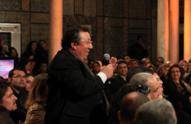 AUDIENCE (M)
AUDIENCE (M)
My question is actually it's about the return or the restoration of dictators and dictatorships in the Arab world especially. I think and I'd like you to tell me later what you think, I think that it depends, the restoration of dictators, of dictatorship, is based on the relationship with the superpowers. In other words it depends on the relationship with the decision-makers of the world.
TIM SEBASTIAN
But it wasn't the superpowers who got rid of President Ben Ali, was it? AUDIENCE (M)
AUDIENCE (M)
Excuse me, I haven't finished my point, because I think, let's take the example of Tunisia, the Tunisian revolution and the American one, sorry, the Egyptian one. Yes, because I'd like to say something about America. The Tunisian revolution is different from the Egyptian one because it was made by the people, and I think the superpowers or decision-makers in the world will not give it that importance. I mean, they will not think that any things that happen in Tunisia will affect the Palestinian/Israeli problem.
TIM SEBASTIAN
Okay, so could we come to a question please?
AUDIENCE (M)
Yes. My question is, do you think that the return or the restoration of dictators is in the hands of the superpowers?
TIM SEBASTIAN
Raoudha Ben Othman.
RAOUDHA BEN OTHMAN
I honestly think that we should stop thinking that we are manipulated from the outside. When this revolution started, it started with people who no longer could bear being looked down on and being treated very badly, and they went out to the streets to change things. We still want to change things. I personally, I wouldn't feel happy at all if actually I see recipes of democracy being even given by the West. I think the West has learned a very good lesson by ignoring what is happening in Tunisia, and now they are learning the lesson, and we should think and we should stop that. There is no model of democracy to be followed or imported, and even those who would like to impose any dictators on us, we should actually stop them.
TIM SEBASTIAN
All right. I'm going to take a question from the gentleman in the front row.AUDIENCE (M)
My question goes to the entire panel whether you're an optimist or a pessimist. Obviously a major question for this country at this point in history is the idea of secularism and how far we can go with it. We've been under a secular dictatorship and we haven't debated this question of religion and politics or religion in politics during this entire time because the Islamists were repressed by both regimes since we got independence from France. So how do you think this question should be addressed, what kind of secularism do we want to have? I hear many people talk about ...
TIM SEBASTIAN
What's your concern behind this question?
AUDIENCE (M)
My concern is I hear a lot of people talk about models to follow and Turkey is often cited as a model and I'm wondering whether we need to import any models like that and whether we cannot develop our own secular democracy in Tunisia and what sort of place do the Islamists have in that kind of framework?
TIM SEBASTIAN
Fares, would you like to take that?
FARES MABROUK
Okay. Definitely we don't know what democracy looks like in the Arab world, so we have to rethink the concept of democracy, we have to invent, we have to adapt this concept of democracy in order to take into account specific threats and context. So the question of which democracy we want, I don't think we will have, I mean, we will have to invent a new type of democracy, and in this democracy we will define and will debate about the role of the religion and how the religion can be integrated in the political sphere, and how, what place will be, what safeguards will be put in place inside our democracy in order to secure women's rights and human rights.
TIM SEBASTIAN
All right. Kamal Ben Younes.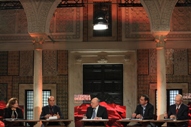 KAMAL BEN YOUNES
KAMAL BEN YOUNES
The question of the gentleman, I agree with him because there is a lot, a big concern about the secularism and Islamism and I explain why I have been talking about the lack of democratic culture and the lack of dialogue. Second, we have being problem both in Tunisia, in Egypt and other Arab countries about misunderstanding between Islamist and secular. Third point, we have big challenge: the social and economic challenge, the jobless and there is a risk for next few years or maybe next few months to have dictatorship because the majority of the people marginalised will be supporting Islamists and extremists.
TIM SEBASTIAN
Right. We're going to take a question from the lady at the back. We'll get a microphone to you.AUDIENCE (F)
Okay. I have a question for Mrs. Raoudha. One of your points in the beginning was that we have to learn how to be democratic. My question is, who has to learn to be democratic? Are you talking about the government, or are you talking about the people because, and here I'm going to make a comment, if you're talking about the people, people are teaching the government democracy. The young generation is teaching the government because they are ages ahead of the government in terms of democracy and democratic thoughts, and if you're talking about the government, my opinion is that we the people, we the new generation, whether we are rural or from the city, we are also the first and biggest safe-guarding force against this government and what happened from the revolution and before, but especially from the revolution, 14th January, til now shows that, shows that we are pushing them to react. They are not proactive, we are pushing them to react, so who are you talking about, who has to learn democracy?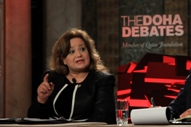 RAOUDHA BEN OTHMAN
RAOUDHA BEN OTHMAN
Thank you very much for this question. What I said was we have as people, we have to learn other forms, other than demonstrating and sit-ins, because that's what really worries me. It's very clear that the government, the people in the government are not listening, and I said some time in the debate that we have to educate them to listen. They are not used to listening, they just don't listen, they don't seem to listen. If we actually define democracy as the government of the people, by the people for the people, all I see right now is that some people who are going to say: "Okay, please vote for us and as soon as we will be legitimately in power, we will tell you what you will do," and I think at that time, the risk is two things, we risk two things. First, that the young people are not going to persevere, perseverance is a costly phenomenon, and the second thing is that these dictators, because they are not going to have everybody in the same direction. Right now I can see, and I said it, that young people have got clear demands.
TIM SEBASTIAN
Okay, I'm going to give the questioner a chance to come back here, to hear her voice.
AUDIENCE (F)
So what you are saying is that you, the elite, thinking and analyst people are going to show those who were in the streets how to persevere.
RAOUDHA BEN OTHMAN
No, no, no.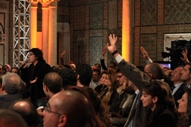 AUDIENCE (F)
AUDIENCE (F)
These people persevered for one month or more and these people are still there, they are still showing and still inventing, we are altogether inventing a new form of democracy. The, how to say, the bourgeon, yes, the germ, not germ, the seed is there but we're still looking, we're still watching and we're still trying to build things.
RAOUDHA BEN OTHMAN
This is exactly what I'm saying. I'm so worried about the seeds because they will be split-up, they will be, I told you, we have to educate them to listen to us, and I am not part of the elite by any means. Actually I am worried, I see that the road to democracy is very long, it's risky, it's dangerous. We have to learn other forms of political participation besides demonstrations and sit-in, and we have to educate our politicians to listen to us, but I don't see any guarantee. All I see is a promise of a free election. A free election is in the constitution.
TIM SEBASTIAN (go questioner)
Okay. Is it your view that you leave it to the people in whatever form the people decide, you leave it to the people to tell the politicians what to do?
AUDIENCE (F)
I think I'm leaving it to us, the people. Trust yourself, trust us. We will make this government listen to us.
TIM SEBASTIAN
Okay.
AUDIENCE (F)
So my question is for Mrs. Raoudha again. You're talking about guarantee. When the revolution started, we didn't have a guarantee that it will succeed or it will be stopped, so now what kind of guarantee are you expecting from the new government, what kind of thing are you expecting from them? A promise or something written and elaborated from a committee or so, what kind of guarantee are you giving?
TIM SEBASTIAN
Perhaps Kamal can take that question.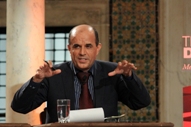 KAMAL BEN YOUNES
KAMAL BEN YOUNES
Okay. I think we have to think about the revolution. We have at last three kinds... Have you been in the sit-in or in the marches? There are at least three kinds of youth in these marches. Some of them are asking the job, job, job, without any political perception. The second, and they are a big part of the revolution council, they are mainly Marxist, leftist, Ba'athist, Nationalist etc. and the third they are Islamists: 1, 2, 3, 4, and there are different perceptions of this revolution. For some, for the elite in the city, the main priority is political. For others the main priority...
TIM SEBASTIAN
She was asking what guarantees, what guarantees are you looking for?
AUDIENCE (F)
What kind of guarantee are you expecting? You are for the motion, so what kind of guarantee are you expecting to stop thinking about this motion?
KAMAL BEN YOUNES
I think best understanding is for the reality, not for our dreams, and to end with all the dictatorship and all the corrupt people, because in my point of view the dictator collapsed and fled but the dictatorship is still there.
TIM SEBASTIAN
And you want it now?
KAMAL BEN YOUNES
Yes.
AUDIENCE (F)
So you don't want to wait and then see. So you want ...
KAMAL BEN YOUNES
We have to understand the reality on the ground not our dreams.
TIM SEBASTIAN
Okay, I'm going to take a question from the gentleman in the hat.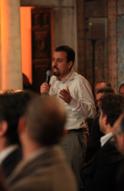 AUDIENCE (M)
AUDIENCE (M)
Okay. My question is for the guests that think that the Arab revolutions are opening the door for new dictators. Don't you think that the Tunisian revolution, which I call the mother ship of all the Arab revolutions and the Tunisian Armada, gave birth to something which I call an "alive spirit", we'll call it Mohamed Al Bouazizi; that will be alive and revolt, call for its freedom whenever it feels that there is something called anarchy, dictatorship and a government for only the one and the chosen one, president which is immortal?
TIM SEBASTIAN
Okay. Raoudha Ben Othman. You clearly don't, is the short answer to that. Would you like to explain why?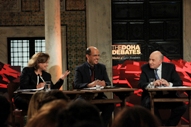 RAOUDHA BEN OTHMAN
RAOUDHA BEN OTHMAN
That's definitely a very short answer. I don't think the Tunisians just to comment on some of your question, I don't think the Tunisians meant for their revolution to be a model for the others. We don't have any intention to export but we are very happy for the other Arabs to see that they can also dégage their dictators, so we are really happy for them.
TIM SEBASTIAN
Kick out, in other words
RAOUDHA BEN OTHMAN
Yes. It's a new anglicised word now. And actually what is going to happen is that, I am personally very worried about this new tendency, because this new tendency will be, we will go back to old habits. We have certain old habits, like we go to science. So many on this panel said that this revolution has no head. I will not be surprised to see a new head springing out of nothing and building new routines of free elections and as soon as they are in power, they will tell you: "Now you voted for me, now I will tell you what to do. I know better."
TIM SEBASTIAN
Okay, Shibley Telhami, why won't that happen? Why aren't Raoudha Ben Othman's fears, why aren't they going to be realised?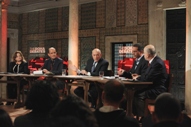 SHIBLEY TELHAMI
SHIBLEY TELHAMI
First of all I don't, you know, I think the empowerment, the spill over effect, is really a function of this openness I was talking about. We don't know exactly what started the event but the fact that it's happening somewhere else doesn't mean that it's going to happen in the same way. I don't think there's a ...
TIM SEBASTIAN
But it's underpinned by emotions alone isn't it, at the moment, not by institutions, but by emotions...
SHIBLEY TELHAMI
It's not by institutions, it's not emotions. I am sorry, I don't agree with that, and I'm not speaking here with my heart. I certainly want this to succeed and I think if it succeeds it's basically Bin Laden's nightmare because what we're seeing is representative peaceful people changing the environment, to the opposite message of it, so I want to see it succeed with my heart, but that's not what I'm speaking with. I'm speaking analytically as a social scientist, I'm looking at the trends in history, I'm looking at what is the force here that explains why we have this spill-over effect and we haven't had it in the past. Why? It's not because people are angrier than they were five years ago. We seen the gap, we've been measuring every single year. It's never been a question in any of the public opinion polls that I do every year in the Arab world.
TIM SEBASTIAN
So in one line, what is it?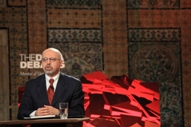 SHIBLEY TELHAMI
SHIBLEY TELHAMI
Well, what it is is that the empowerment of the individual because of the openness that we have that comes from the information revolution, and I don't mean just the internet, I don't mean the social media. I mean that people no longer trust the information coming from the government. They have other sources. I mean, the empowerment to being linked to the outside world and I mean the instruments available for them to organise. That is a huge element, and we have to understand it.
TIM SEBASTIAN
Okay. All right.
SHIBLEY TELHAMI
It is, it is the force of history, and it's expanding every single year, it's not going backward and no-one can put that genie back in the bottle, trust me, Tim.
TIM SEBASTIAN
Why am I always wary of people who say: "Trust me." Can we take some questions for this side, more for this side please, because most of them have been directed, some questions for those who are against the motion please. Your question's against the motion? Yes okay, you sir.
AUDIENCE (M)
Imagine that the Tunisian seeks ways to tackle the whole body of dictatorship, and America is under pressure from its Israel lobby to pressure Tunisia to recognise Israel. Does America accept a democratic Tunisian regime but which refuses to sign peace treaty with Israel. Thank you.
TIM SEBASTIAN
So you're basically worried that whatever government emerges will be just simply subject to pressure from the superpowers, subject to pressure from America. That's your worry.
AUDIENCE (M)
Yes, maybe United States pressure the Tunisians to choose dictatorship rather than democracy.
TIM SEBASTIAN
Okay.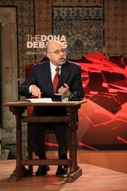 SHIBLEY TELHAMI
SHIBLEY TELHAMI
I think there's no question that is an issue, that superpowers act with strategic interest and right now there's no question the US is, on the one hand people want to see democracy, on the other hand they're worried about strategic interest.
TIM SEBASTIAN
But they've never supported democracy in the past in this region, have they?
SHIBLEY TELHAMI
Well, of course the Bush administration said it did, but it had the exact opposite, but let's put it aside. Whatever the strategic interests with Egypt, the change happened. Whatever the strategic interests with Tunisia, the change happened, and I would even go the opposite. It's not up to the US any more. I mean, the US has power and influence but it's not up to the US to determine, and I don't think it'll succeed if it goes against the will of the people, and I'll go even a step further. If you isolate, if you go like we're doing with Iran, we have sanctions, we're imposing sanctions on Iraq, like we've imposed on Cuba for several decades. That isolating people, that's not empowering to their people, because if I'm right that this information openness to the outside world is one reason why the public is empowered and why people are robbed of the possibility of saying: "It's the outside power you see that's happening." If you have a country like Iran or a country like Cuba that is isolated by the international community, it actually keeps them from reforming.
TIM SEBASTIAN
Kamal wants to just come in briefly.
KAMAL BEN YOUNES
... for the double standard, foreign policy of US and mainly for Israeli question , and I believe that in Egypt the power is in the hand of the same corrupted army, the same military dictatorship, only Mubarak left, and the guarantee was that they have to respect Camp David and all arrangements with Israel from 1978.
TIM SEBASTIAN
Fares.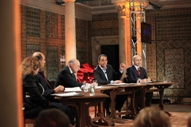 FARES MABROUK
FARES MABROUK
I think this would be the consequence of a democracy. What I mean is, because democracy will make Arabs more vocal, I think this would put more pressure on Israel to find a solution but not the opposite.
TIM SEBASTIAN
You don't think a democracy is going to be more easily pressured by the United States?
FARES MABROUK
No, I think after democracy, I mean, this country including America will have to put more pressure on Israel to find a solution.
TIM SEBASTIAN
Okay, all right. Lady over there, you've had your hand up for a while. If we can get a microphone to you please.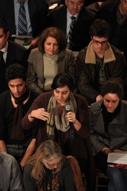 AUDIENCE (F)
AUDIENCE (F)
Thank you. This question is for both sides. To the negative side, to what degree, you talked about psychological change in the society, I mean, to the negative of the resolution.
TIM SEBASTIAN
Those against the motion.
AUDIENCE (F)
Yes, sorry, those against the motion. To what degree do you think that Tunisian civil society or Arab civil society needs to move in order to kind of guarantee that we're making the right steps toward democratisation? And then for this side, the affirmative side, what do you say to the fact that civil society in Tunisia has come alive, that young people in organisations and others, have come alive and are taking, you know, their futures, the future, by their hands?
TIM SEBASTIAN
Okay, Raoudha Ben Othman, do you want to take the question first of all, take it the wrong way round but ...
RAOUDHA BEN OTHMAN
Yes. Well actually I feel that this guarantee issue is popping up again and again, and I would like to say that what I see generally, and that's maybe a general characteristic of Arabs, is that we have been trained through history by, silence for us is a sign of consent. If you elect, if you choose to be loyal to some party or to one person, and you actually gave a sign of loyalty to this person, what you pay afterwards is your silence because your silence is a sign of your consent. That's why I said we need new practices of political participation. We need do say: "Yes, we voted for you, but actually we are worried, we want accountability."
TIM SEBASTIAN
So what are you telling her to do, not be silent any more? What are you saying?
RAOUDHA BEN OTHMAN
And actually learn both how to educate politicians to listen to us and second, we have to learn other forms of political participation, and get rid of this loyalty issue.
TIM SEBASTIAN
Okay. Shibley Telhami.
SHIBLEY TELHAMI
You asked about civil societies. I mean, there is no question that the more, the better, but that is not really a guarantee, to be honest. Now, if you look at the history, we have a problem defining what civil society is. What about all the Islamist groups that should be included in civil society, that have been discounted by the West and looking at what civil society is. We haven't seen the institutions that were supported from the outside as civil society, be the impetus for the change that we've seen either in Tunisia or Egypt.
TIM SEBASTIAN
So what is it if it's not civil society, what are the guarantees?
SHIBLEY TELHAMI
I think it's public empowerment, and I think it's the empowerment of the individual, people who know that there is a better world ...
TIM SEBASTIAN
Through institutions or on the streets?
SHIBLEY TELHAMI
No, this is the thing about it, it's not, I mean, institutions are helpful, we need them, they can be ultimately supportive, but I think what was extraordinary about the organisation is it happened without the need for immediate institutions.
TIM SEBASTIAN
Okay. I'm going to take a question from the gentleman over there please.
AUDIENCE (M)
Thank you. My question goes to Mr. Mabrouk and Mr. Telhami. I think the biggest threat to achieving a successful transition to democracy in Tunisia is the lack of time. Voters in this country are supposed to go to the polls in just about five months. Is it realistic to assume that this will give different players, various players, enough time, a sufficient amount of time, to do what's needed to achieve that kind of transition? Talking about the media, which needs to get its act together, and to get rid, to kick the habit basically inherited from the old order of the old regime. I'm talking about the political parties; do they have enough time realistically to elect new leaders, to have new constituencies, to devise a political agenda, so is that realistic? And I would like to talk about Egypt as well.
TIM SEBASTIAN
Sorry, we don't have a lot of time so if they could just address that question I'd be very grateful. Fares Mabrouk.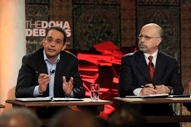 FARES MABROUK
FARES MABROUK
Yes. Actually I see that as really the chance, as an opportunity, because the fact is, this revolution has no leadership, and because there is no leadership, it's organic, spontaneous, and with micro-leadership, so all the political parties are today at the same level, so I see, I mean, I see the need for an election in six months from now, because six months from now, I mean, there will be competition and the government will have to invent a way to organise this election, but if we postpone this date, we'll never now, maybe the former ruling party will come back, so six months is a perfect time for me.
TIM SEBASTIAN
In your view, if I can just come back to the questioner, in your view are things moving too fast or too slowly for you?
AUDIENCE (M)
I think we're rushing to elections. I don't think we have prerequisites, the pre-requisites for a level playing field when it comes to going to the polls. I don't think parties will have enough time to engage in a truly transparent and open democratic competition.
FARES MABROUK
.. competitions. It will begin at the same level and then I mean, this is democracy, so we will have to invent a new way to empower this party, empower the capacity.
TIM SEBASTIAN
Raoudha Ben Othman, you wanted to say something on this.
RAOUDHA BEN OTHMAN
Well, actually I totally and utterly agree with you. We feel that we are rushed and there is no reason why we are rushed. We are rushed because the people who want to take over the power are rushing, and they are rushing us into this, and if we look at the opposition parties, all of them, with due respect, are the result of the old regime. I mean, whether they have co-operated or not, they are made by the Ben Ali regime. They have made compromise, they were silent, they tried to survive, and they are not in any position to make a real plan for the future. We cannot trust them with the changed team. That's exactly what we want to say. We cannot trust the existing political parties with the change, unless we also, sorry, we need also to move a step forward and teach ourselves how to participate politically..
TIM SEBASTIAN
All right. I'd like you if possible just to give the microphone to the gentleman there and pass it down, to get a very quick comment from each of you along in the front row, and then we'll do the 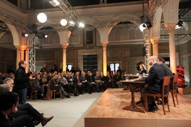 same in this front row as well, to see whether people think you're going too fast in the revolution or two slow. A very quick comment then please pass the microphone along.
same in this front row as well, to see whether people think you're going too fast in the revolution or two slow. A very quick comment then please pass the microphone along.
AUDIENCE (M)
Well, I'm an optimist, so I think we are heading in the right direction. I'm not happy about the fact that this government is unelected and I support the people who are protesting down the road, but I also think that we need to have elections in a free and transparent way.
TIM SEBASTIAN
Okay. Gentleman next to you. If you could stand up please.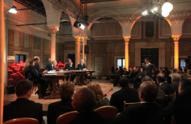 AUDIENCE (M)
AUDIENCE (M)
I think that the civic society failed completely with this revolution, but we have an active cyber society that will protect it.
TIM SEBASTIAN
Gentleman next. Thank you.
AUDIENCE (M)
We had the quickest revolution in the world, three weeks, so we'll get the quickest transition to democracy.
TIM SEBASTIAN
Gentleman next. If you would stand up so we can see you please.
AUDIENCE (M)
I'm not sure it's a relevant question actually because people are still shouting in the streets and asking to change the transition government, so maybe the elections that are being promised in six months won't be in six months. Maybe we'll have other ways to democracy.
TIM SEBASTIAN
Gentleman next to you please.
AUDIENCE (M)
I think that the people on the ground and both on-line and off-line who shaped this revolution and toppled this government and shook the region, are capable of keeping on this revolution and protecting it.
TIM SEBASTIAN
Gentleman next to you.AUDIENCE (M)
Very, very small comment. I think what I heard, the old school of thinking [points to the speakers for the motion], the new school of thinking [points to the speakers against the motion]. The old school of thinking, because your arguments ...
TIM SEBASTIAN
When you say "The old school of thinking", you are talking about those who are for the motion; you are calling them the old school of thinking."
AUDIENCE (M)
I would have heard your arguments twenty years ago, but it seems to me that your calendar stopped at a certain date: 7th November 1987.
TIM SEBASTIAN
Okay, okay.AUDIENCE (M)
Hi. In fact I'm just worried about what should come first, writing a new constitution or voting for the president in six months. This is my question. Actually I just wanted to ask it. Should we elect the president in six months and then go over and write a new constitution that could actually remove the power of a president.
TIM SEBASTIAN
Okay. Could you pass the microphone on? Thank you.
AUDIENCE (M)
I have one concern regarding the mass media, television and the radio. When you know all the licences has been delivered by BAT people to their relatives ...
TIM SEBASTIAN
The wife of the former president.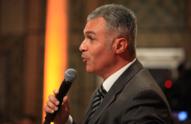 AUDIENCE (M)
AUDIENCE (M)
Yes, yes. And we know that in all the democracies they play a major game to elect the president and the ruling party so could have concern regarding this.
TIM SEBASTIAN
Okay, and the lady next to you.
AUDIENCE (F)
I'm an optimist and I am sure that everything going to be all right.
TIM SEBASTIAN
Okay. Can we get a microphone this side please and we'll take it to this front row. Start with the gentleman there. Brief comment please.
AUDIENCE (M)
So we are very optimistic because we believe that democracy is a process and in each process there are steps. We have passed many steps and we must keep, keep going on those steps, but we must to it step-by-step.
TIM SEBASTIANOkay, gentleman next to you.
AUDIENCE (M)
I am very optimistic on the political field but maybe a pessimist on the economic field.
TIM SEBASTIAN
Gentleman next.
AUDIENCE (M)I think it we will go through difficult times perhaps for two years but I'm optimistic.
AUDIENCE (M)
We remain optimistic despite the young age of the revolution, it should be just protected.
AUDIENCE (M)
I know we're always against foreign intervention in different countries coming to Tunis but I definitely hope that the outside world is looking in and that we get full transparency with any elections or constitution that's going to be written.
AUDIENCE (F)
As a foreigner, I wish Tunisia luck in this transition process and I'm optimistic that you'll end in a good place.AUDIENCE (M)
I'm optimistic. I think there will be very big challenges ahead but I think the important thing is partnership between government and civil society, and external players you want to support.
AUDIENCE (M)
Yes, I'd like to see the process move faster towards democracy. I think the Tunisian people have shown that they're ready for it and I think we need to see, give the people something to look forward to now, to stop the individual grievances and move to the next process.
TIM SEBASTIAN
Raoudha Ben Othman, are you encouraged by the amount of optimism?
RAOUDHA BEN OTHMAN
Well, I mean, I have never said that we are not fit for democracy. You know, Tim, I've never had a voting card in my life. I was punished, with my family, we have requested the voting cards. I've never voted in my life, and I want to do it and I want actually to assume my choice, and it doesn't matter if we make mistakes, but I want to vote and assume my choice and try to make a change, but democracy is a long road, it's a risky road, and I feel that we need to be careful and we need at least the courage to say we have obstacles and if we do not identify the obstacles, we are not going to overcome them.
TIM SEBASTIAN
All right. The lady at the back has had her hand up for a very long time. If we can get a microphone to you.
AUDIENCE (F)
Thank you. My question is very simple. This revolution was mainly made by young people. With all my respect to the speakers today on stage, I don't see one young person on this stage today. My question is ...
TIM SEBASTIAN
Can we have a question. That was a comment.
AUDIENCE (F)
My question is ...
TIM SEBASTIAN
That was a comment, can we have a question?
AUDIENCE (F)
My question is, isn't it time to listen to the young people, just like we listened to them on the streets, to listen to them on these platforms?
TIM SEBASTIAN
Well, I hope we did actually, I hope we listened to one or two. We're listening to you now.
AUDIENCE (F)
I only listened to questions, I was hoping to listen to answers about this motion from the stage, from young people.
TIM SEBASTIAN
We're listening to you now. That's the main point, we're listening to you now.
AUDIENCE (F)
I hope you have an answer for that question then.
TIM SEBASTIAN
It wasn't a question, it was a comment. I take the comment on board. If I could take 30 years off my age, I willingly would. All right, so we'll take a question from, it had better be a young person back there, yes, you sir. Yes, you.
AUDIENCE (M)
Dr. Telhami mentioned the role of fear in political prophesies in the beginning, and I do believe that fear will play a role in the way Western democracies will react to these revolutions. Now, my question, do you think that if confronted with the risk that an elected Islamist government will come along, Western democracies will rush to support the first dictator that comes along and promises to crack down on political Islam in Egypt or in Tunisia?
TIM SEBASTIAN
Shibley Telhami
SHIBLEY TELHAMI
You know they could, and obviously I think you're correct in identifying that, particularly what happened, you know, in 1989, you know what happened in Algeria and how the US reacted, and also the Gulf War which basically put pressure on stopping democracy as well. Here's the thing. Number one: the US has not been very good, foreign powers have not been very good at determining outcomes when they try to engineer an outcome. Look at the US record. There was a hope that they would have a Hariri government in Lebanon. You have now Hezbollah-dominated coalition. There was an election that was started by the Bush administration, the Palestinian election, Hamas won that election. In Iraq even after a war, hundreds of thousands of troops if you add them altogether present in Iraq, the outcome that is there now, the government, the coalition government is not at all what any American official could have imagined would be favourable to the US. Number one, the US hasn't been good at it. There's recognition of the limits of American power, and I think people in the region over-estimate how much influence the US has in determining outcomes. Yes, there are interests that they have to deal with, with now there's a whole debate in Washington about whether there should be support for the forces of history and change, and being responsive to public demands or to stick with old dictators.
TIM SEBASTIAN
Can we go back to the questioner just for a moment, sorry to interrupt you but ...
AUDIENCE (M)
Why do you think the US or any other Western democracy will change their long-standing habit of supporting authoritarian regimes in the face of the slightest threat of Islamist regimes.
SHIBLEY TELHAMI
In part because I don't think they can succeed. That's the point that I was making, that in every case of intervention of the US trying to determine what an outcome is in times of transition, the US has ended up with exactly the opposite.
AUDIENCE (M)
Why did it change now, after the revolutions?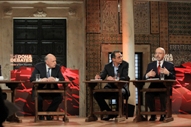 SHIBLEY TELHAMI
SHIBLEY TELHAMI
Well, I think it's what we see in Tunis and Egypt. Part of the debate on the fear of Islamists, one of the reasons why people are sitting puzzled and in awe of what happened is that number one, it's peaceful. It's the opposite of what people had said would happen, what it would take to overthrow regimes, and number two, that was non-ideological.
TIM SEBASTIAN
Shibley Telhami, it doesn't look that peaceful in Libya, does it.
SHIBLEY TELHAMI
No, I'm sorry, I disagree with you. The demonstrators were peaceful. The government is not peaceful.
TIM SEBASTIAN
The process is not peaceful.SHIBLEY TELHAMI
The government is not peaceful.
TIM SEBASTIAN
The process is not peaceful.
SHIBLEY TELHAMI
Yes, the process is not peaceful but still those who are calling for freedom are doing it peacefully, that's what matters. Now, obviously the outcome matters on how a government responds, but I think the Libyan regime has lost already, and unfortunately a lot of people have paid a price for it.
TIM SEBASTIAN
All right, we'll take a question from the gentleman in the centre there. You, sir.
AUDIENCE (M)
Thank you. I would like to as a question for the panel who are for the motion. My first question is for Miss Ben Othman. You know, I was a student in university of Manouba and I suffered from the lack of quality in our education system, so instead of being sceptical, what kind of alternative are you suggesting to reform our education system, and the same question for Mr. Younes, what kind of reform do you think we need for our media, mass media, in Tunis?
TIM SEBASTIAN
Raoudha.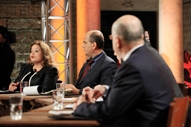 RAOUDHA BEN OTHMAN
RAOUDHA BEN OTHMAN
I haven't expected the question of quality of education but, yes sure. I am, the point is that I'm not pessimistic. I am just realistic and I am a bit careful. I think I am so proud of this revolution, I am, I'm very worried of what's going to happen in the future, and if you are actually saying that because I keep making the point that quality ... If students graduate from the university with poor quality, they are actually not a benefit to the society, they are the opposite of that, and I still, I still make this argument.
TIM SEBASTIAN (to questioner)
Please stand up so we can hear.
AUDIENCE (M)
What are the reforms, what are the solutions? People now are talking about the past, Ben Ali did this, Trabelsi did that. What is the future, what are the reforms?
RAOUDHA BEN OTHMAN
The reform for education is really huge. We need to reform. First of all we need to see students who think it critically, who are creative, who are not repeating by heart ...
TIM SEBASTIAN
What about changing teachers?
RAOUDHA BEN OTHMAN
Sorry?
TIM SEBASTIAN
What about changing teachers? Ending censorship.
RAOUDHA BEN OTHMAN
Oh, censorship, yes, sure.
TIM SEBASTIAN
New school books, new books.
RAOUDHA BEN OTHMAN
There is so much to be done in education, and this is for the future generation, this is what we owe the future generation. There has been ...TIM SEBASTIAN (to questioner)
What do you want, what do you want first?
AUDIENCE (M)
Well, such an example of reform as a professor. She has the experience, so she doesn't give the audience reform...
TIM SEBASTIAN
But what do you want, what do you want?
RAOUDHA BEN OTHMAN
A reform plan, a reform plan.
AUDIENCE (M)
Examples of reform from her.
TIM SEBASTIAN (to questioner)
You're going to wait for somebody else to provide your reform plans or come up with it yourself.
AUDIENCE (M)
She can suggest something as a reform.
RAOUDHA BEN OTHMAN
Yes. We, I mean, I personally think that I need to see university graduates who take more responsibility of their learning, who take more responsibility of their employment who are actually, who go forward and make their own entrepreneur business. I need to see university graduates who are actually courageous, who are brave and who go for a change, and this happens through education, but not through one plan, it's a whole process of reform, from primary education to university.TIM SEBASTIAN
Okay. Are you happy with that?
AUDIENCE (M)
No.
TIM SEBASTIAN
Why not?
AUDIENCE (M)
And also my question about journalism, about the mass media.
TIM SEBASTIAN
About the mass media.
KAMAL BEN YOUNES
I think we can discuss this idea. I have been frustrated for 25 years as a journalist. When my friends or colleagues said: "We heard you in BBC saying something and in our Tunisian newspapers we don't, we don't cover these events." Or I have been frustrated when at least one hundred of my colleagues, Tunisian colleagues, who have been in Tunisian TV moved to Al Jezeera and became stars. I think we have to change the system of mass media. Unfortunately one of the few big mistakes, until now there is no change, sure is a change in mass media. I think we have to change the media.
TIM SEBASTIAN
Yes but in what way, in what way are you going to change it?
KAMAL BEN YOUNES
For more freedom, more freedom of thinking, more freedom of expression, to respect the news, the right of news and we have to change. One of the speakers said that a lot of institutions are still property of the family of Ben Ali.TIM SEBASTIAN
Okay, all right. I'm going to take a question from the lady in red at the back. Sorry, you're not the lady in red I don't think. I think she is, yes. Thank you very much. She's had here hand up for a very long time. Thank you.
AUDIENCE (F)
Good evening. So the Tunisian revolution actually happened in a relatively civilised way, but what I'd like to say is that it is easy to criticise the actual government and actually makes me say: "Wow, we should have done that ten years ago." But at the same time I think that the population that is right now outside making the revolution is the same one that was silent for 23 years.
TIM SEBASTIAN
So what's your question?
AUDIENCE (F)
My question, I'm sorry, my question is criticising doesn't feel very objective, and actually what I like to hear from people criticising the actual government is concrete alternatives to what we have already right now. Thank you.
TIM SEBASTIAN
Well, in a way you've been talking about concrete alternatives.
KAMAL BEN YOUNES
There is no programme and there is no alternative for all or the main political parties. I agree with you.
TIM SEBASTIAN
Okay, all right. We're going to take a question from a lady back there. Yes, you, you. Thank you very much.
AUDIENCE (F)
I wanted to ask something about, something we haven't at all covered here. It's about internet and the power of internet in driving this revolution. It's more about that than Arab revolutions bringing us new dictators, and the thing is, I mean, the way I read what happened is that this revolution has been brought on the internet, and has enabled us to free ourselves from our dictator, but what I'm seeing in the internet and if I connect to Facebook and I think everybody here is connected on Facebook, it's only one political figure always on the right of my page popping up all the time, each time I connect, and this is not at all happening from any other political member of any party, so what I'm saying is, we really wanted to be self-governed somehow, but what's happening is that some political leaders have understood the fact that internet is very powerful and he could really get us into, I don't know ...
TIM SEBASTIAN
So are you complaining it's a battle on the internet as well?
AUDIENCE (F)
Sorry?
TIM SEBASTIAN
Are you complaining that you're having to battle on the internet as well?
AUDIENCE (F)
Yes, because people are using it to express themselves, but at the same time they're looking for a figure, I mean, for a leader to come out.
TIM SEBASTIAN
Did you think you would have I all your own way?
AUDIENCE (F)
Sorry?
TIM SEBASTIAN
Did you think you would have it all your own way?
AUDIENCE (F)
Well, I don't know, I don't know, but it's just that I'm a bit worried about the fact that we're always asking for freedom of expression, which I totally believe in of course, but the thing is that we're also looking for leaders through the internet and not only, because we're not seeing that in the media, we're not seeing that on the ground, so ...
TIM SEBASTIAN
All right. Shibley Telhami, do you detect that in the polls that you do in the US, in the Arab world?
SHIBLEY TELHAMI
Well, I think the internet of course is a huge part of it. You know, we have to understand it. It only expanded in the last five years on a large scale enough to be as pervasive and important as it is. When I say the media, by the way, I don't only mean the internet, I mean all of it including the satellite television which changed a lot because it took away the monopoly of information of the state, but I do understand your point though about the looking for leadership. Right now it's a diverse, dispersed number of voices who had something in common, and then you know, what next in terms of organising, particularly when you infuse yourself in the political process. It's messy and I don't predict how it'll come out. I now that change is messy, but I know the trend is for the better, not backward. With all the messiness and all the steps back and two steps forward, I don't know how it's going to work out but I know it'll move forward.
TIM SEBASTIAN
Okay, gentleman in the second row over there. You had your hand up for a while.
AUDIENCE (M)
Thanks very much. Well, further to the Tunisian revolution, people all over the Arab world started talking about democracy, democracy and democracy, so democracy was a kind of catchword. However, to avoid the return of dictatorship, there is a balance that must be guaranteed, namely democracy, the rule of law and security, and my question is, to which extent the coming governments in the Arab countries will be able to guarantee such a balance.
TIM SEBASTIAN
Fares Mabrouk, take that question.
FARES MABROUK
Okay. Definitely I think the democracy will not be perfect at this first stage in the next six months. We will need to invent a new way of a counter-balance actually of power. Now, I trust the civil society. I think there is a huge vacuum in Tunisia, especially in Tunisia, of civil society. There is public sector, private sector, but a vacuum in the civil society. And I believe that in the very near future, there will be a huge number of initiatives and this civil society will play this role to counter balance and talks of how democracy will work.
TIM SEBASTIAN (to questioner)
Do you trust civil society?
AUDIENCE (M)
Well, in a certain extent, because we have also, the civil society has an important and a major role to play: to supervise the people, and here is the real problem because people must be supervised by the civil society.
FARES MABROUK
What do you mean by supervising the people?
AUDIENCE (M)
I mean, to try to explain to the people what are the priorities especially in certain periods of time. For example what we are living unfortunately now in Tunisia is the fact that people are claiming several things of personal character, I mean, of a social character, and maybe it is not the time for such claims for the moment.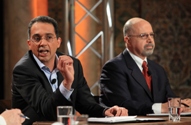 FARES MABROUK
FARES MABROUK
But this is part of democracy. I mean, maybe for you it's not the time but for them it's the time, and part of the game is to accept that people express I mean, themselves even if you think it's not the time.
AUDIENCE (M)
Of course it is a part of democracy. However we cannot in your other very important things, namely the rule of law as well.
TIM SEBASTIAN
Raoudha Ben Othman, the role of civil society, how important?
RAOUDHA BEN OTHMAN
I think the civil society can give people a floor for political participation, some floor, but I don't think that they should be supervised. I mean, I don't think that anybody has got the right now to tell the Tunisian people what they should do and how they should define democracy. They should be given time and space in order to make up their own way of democratic practices.
TIM SEBASTIAN
But you were complaining earlier it's taking too long, the whole process is taking too long. You want to see more results.
RAOUDHA BEN OTHMAN
No, I am complaining that it is taking too short. I have been complaining that we have been pushed to elections and as soon as we elect somebody else, we are going back to old routines. These people, they actually want to get the legitimate power in order to tell us, it's as if they tell us, I mean: "You tell me what you want and I tell you what you need." They think that they are fit to tell us what we need.
TIM SEBASTIAN
All right, gentleman over there please.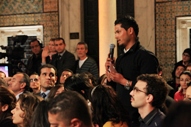 AUDIENCE (M)
AUDIENCE (M)
I'm sorry. Before taking the microphone, I have just a small observation. Here we have two wings of the panel, two people who are living inside Tunisia, maybe they are closer to the Tunisian society, and from the other side we have two people, I don't know what to say that you are outsiders at all, but two peoples who used to live in a democracy, and I wonder if this fact could have interfered on your opinions for or against the motion.
TIM SEBASTIAN
Thank you. Do you want to say something about that?
SHIBLEY TELHAMI
Absolutely. Okay. Look, I will not be the one who will make the judgment about Tunisian politics, but to say we are outsiders is incorrect because we're students of the region and I have my ear to public opinion in the region, annual public opinion polls in six countries including North Africa, every single year, on what the public does, what media they watch every week, how much use of the internet, what their opinions are on social issues, what their opinions are on foreign policy. I watch the social media, I study it. I've documented it from year to year over a dozen years. The best data set we have on public opinion in the Arab world over the past dozen years. Perhaps that's not being an expert on Tunisia, but it certainly is an expert on public opinion and change in the Middle East.
TIM SEBASTIAN
Okay. I don't want to get too bogged down in your qualifications. Thank you very much. Gentleman over there, you have a question.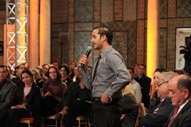 AUDIENCE (M)
AUDIENCE (M)
Thank you. I think that the main problem is that the previous system was like, sorry for the word, a cancer, and a cancer needs radical surgery. The question is that when you're talking about the government now in Tunisia, we're talking about the same icons of the previous system. So my question is, do you think that with the same tools and I mean by tools the same persons, the same constitutions, the legal tools, that provided dictatorship, we can talk about, are we able to talk about a democracy?
TIM SEBASTIAN
Fares Mabrouk.
FARES MABROUK
First of all, you know, if you read the constitution of 1861, the first constitution in the Arab world, the Tunisian one, you would find it very, I mean, there are great things in this constitution.
TIM SEBASTIAN
No, but he's saying it's a cancer; it needs to be cut out.FARES MABROUK
No, I'm talking about today there are two things, people and the constitution. The system is okay. The application of the constitution is a problem, but now when you come to the people I agree, completely agree with you. This is why we need elections and we need to have a legitimate government but not, I mean, we will discuss the constitution later, let's apply the constitution as it is.
TIM SEBASTIAN
So do you acknowledge at least that the revolution is under threat until there is a new elected government? That there are dangers?
FARES MABROUK
Yes. What I'm saying that we have to maintain the pressure on the government until we have legitimate one, and that's not what people are doing here.
TIM SEBASTIAN
I want to just go back to the questioner briefly and then I'll come to Raoudha. Yes.
AUDIENCE (M)
But if we will apply the same constitution, we should take into consideration that this constitution was signed by Ben Ali, so we can't use it in the process to democracy.
TIM SEBASTIAN (to questioner)
You want to get rid of the constitution itself then?
AUDIENCE (M)
We want a new constitution and we want to change persons because personally I can't say enough. Everyone is talking about experience. No one is born with experience. Let young people lead the country, because we're now able to lead it.
TIM SEBASTIAN
Okay, all right, Raoudha Ben Othman, you have a word.RAOUDHA BEN OTHMAN
Actually I would like to take up on the metaphor he used, the cancer metaphor. This is exactly my argument. Some people believe in surgery, and I do agree. I mean, we need radical change, we need to get rid of the old constitution, and my point is that we need also to help the political body of the Arabs, get more immunity. We cannot, actually we cannot afford letting another cancer coming in and then we go back to surgery. How long do you think we need to have, I mean, we need to take before we have another revolution? So yes, cut with the past, absolutely right, but also boost the immunity system of the political body, and you cannot boost it unless we learn new political participation forms.
TIM SEBASTIAN
Okay, all right. Lady at the back, you had a question. You've had your hand up for a while.
RAOUDHA BEN OTHMAN
Is this democracy, Tim?
TIM SEBASTIAN
Yes. It's allowing as many people as possible to have a say.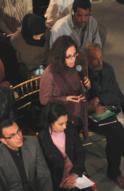 AUDIENCE (F)
AUDIENCE (F)
Good evening. Now I have a question for Sir Ben Younes who was talking at the beginning about the US and Israel security to be maintained, and that this will make the US and Israel contribute to establishing a new dictatorship in our country. Now, I want to ask you, how can you be so confident about the US power and the Israeli power while we have in front of us now a US government with no coherent foreign policy, with a US government that failed to be effective in the Iranian case in summer of 2009, and the Egyptian case where Barak Obama some days saying: "Exhort on the Egyptian President Hosni Mubarak to leave" and other days draw him back and ask him for an orderly transition.
TIM SEBASTIAN
Okay. Kamal Ben Younes.
KAMAL BEN YOUNES
I agree with you but we have to take in consideration that there are several factors, not only one, but I believe that one of the problems of our two revolutions both in Tunisia and in Egypt: there is a weak civil society, weak political party, there is no global programme, an alternative for the revolution. We don't have leaders like in Iranian revolutions, and the external element, the external factor is very important, mainly in Egypt, and I believe that the West gave the green light for change to the army when they get guarantee that the new government will respect Camp David agreement.
AUDIENCE (F)
How can you talk about the green light where the US official spokesman told, and I don't remember the name, he was just saying that no-one, even the American intelligence community or the Israeli intelligence community can predict that the fruit seller in Sidi Bou Said will set fire to himself. So how can you talk about the green light?
KAMAL BEN YOUNES
It depends. It's different. In Sidi Bou Said and in Tunisia revolt and the revolution, it's different than the Egyptian one or in Bahrain. There are different interests. In Tunisia, the Americans supported the revolution after January 14, but in Egypt, I believe that they stopped the change for a few days or maybe for a few weeks; and when they got guarantee that the new government, the new establishment, the new military leaders will respect Camp David, they gave green light for change.
TIM SEBASTIAN
Okay, gentleman at the back, your question please.
AUDIENCE (M)
I'll go back to the issue of frustration about the revolution and the pace of change. I think that one should keep in mind that this revolution, I mean, there is a difference between freedom and democracy. This revolution brought us freedom but it did not bring us democracy. Democracy is a process. I think we should be aware that we have almost cemented this freedom but now we have a long way ahead of democratisation and democracy transition process, so once we focus on this process, we'll be more comfortable about the pace and the road ahead.
TIM SEBASTIAN
Shibley Telhami, can you cement freedom without democracy?SHIBLEY TELHAMI
Yes. I mean, in fact the motion that we have is really not about whether we have democracy or not, it's whether, you know, or not we're going to go back to dictatorship and if you ask me are we moving toward democracy soon, I can't answer that. All I can say is that we're moving away from dictatorship, we're not going back, and it is a messy process and it's going to vary from one country to another. I can't answer about Tunisia, but I know because some of the things that matter here is not just public environment, the makeup of society, the distribution of power, the institutions that will remain important. Every country is going to be different; we're already witnessing it. In Tunisia what was remarkable is that you have a relatively homogeneous voice. We didn't have a homogeneous voice and you didn't have all the divisions that you might have in Bahrain or you might have in Iran, or you might have in Yemen, and you wonder whether the fear of some other group controlling will trump the fear of the government they don't like. And that becomes a completely different dynamic, so I don't say that what is likely to happen in Tunisia will be the same that's going to happen in Yemen, but what I can say is there is a new force and it's a historical force, it's irreversible which is the voice of the people, that's going to play a role in very single one of these countries and will determine that dictatorships are in history.
TIM SEBASTIAN
Okay. I'm afraid we're running out of time for questions. What we are going to do is ask each of the panellists to just give a very, very brief summary, just one answer before we go to the vote, so please just give us one sentence.
RAOUDHA BEN OTHMAN
We vote, sorry, we long for democracy but the road to democracy is really long and we should be wary of the pitfalls, so please vote for the motion.
TIM SEBASTIAN
Kamal Ben Younes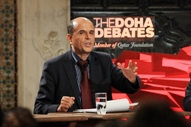 KAMAL BEN YOUNES
KAMAL BEN YOUNES
By my heart I'm an optimist but if I have to take in consideration all the main players, the military, the security establishment, the current establishment, the current power, the external power, I have a lot of ... I'm scared about the future.
TIM SEBASTIAN
Fares Mabrouk. One sentence please.
FARES MABROUK
Yes. You know, at the end of the day, people's will is triumphing and democracy is loading.
TIM SEBASTIAN
Shibley Telhami.
SHIBLEY TELHAMI
Change does happen in history. I know we predict the future by looking at the past. Change does happen in history. We have a change, forces of change, people have tasted pride, they have tasted freedom, they don't want fear again and that's an irreversible force.
Vote result
TIM SEBASTIAN
Okay. Thank you very much. We've come to the point of the proceedings; we're going to vote on the motion. Let me just explain to you how these voting machines work, if you'll just take them in your hand. If you want to vote for the motion, that's the side represented by those on my right, you press button 1 followed by the OK button. If you want to vote against the motion, that's the side represented by those on my left, you press button 2 and then the OK button, and whichever one you want to do, would you please do it now. You only have to press each button once and through the miracles of modern science your vote will be sent to our computers and we should have the result for you on the screen very shortly....
All right, the result should be there on the screen any moment now. There we are, 26 percent for the motion, 74 percent against. The motion has been resoundingly defeated. All it remains for me do is to thank our distinguished panel of speakers. Thank you very much for coming tonight. Thank you to you, the audience. The Doha Debates will be back again in a few weeks' time, but from Tunisia and from the first free debate, political debate for decades in Tunis, that's all from us tonight. Good night, thank you very much indeed.
Watch online

